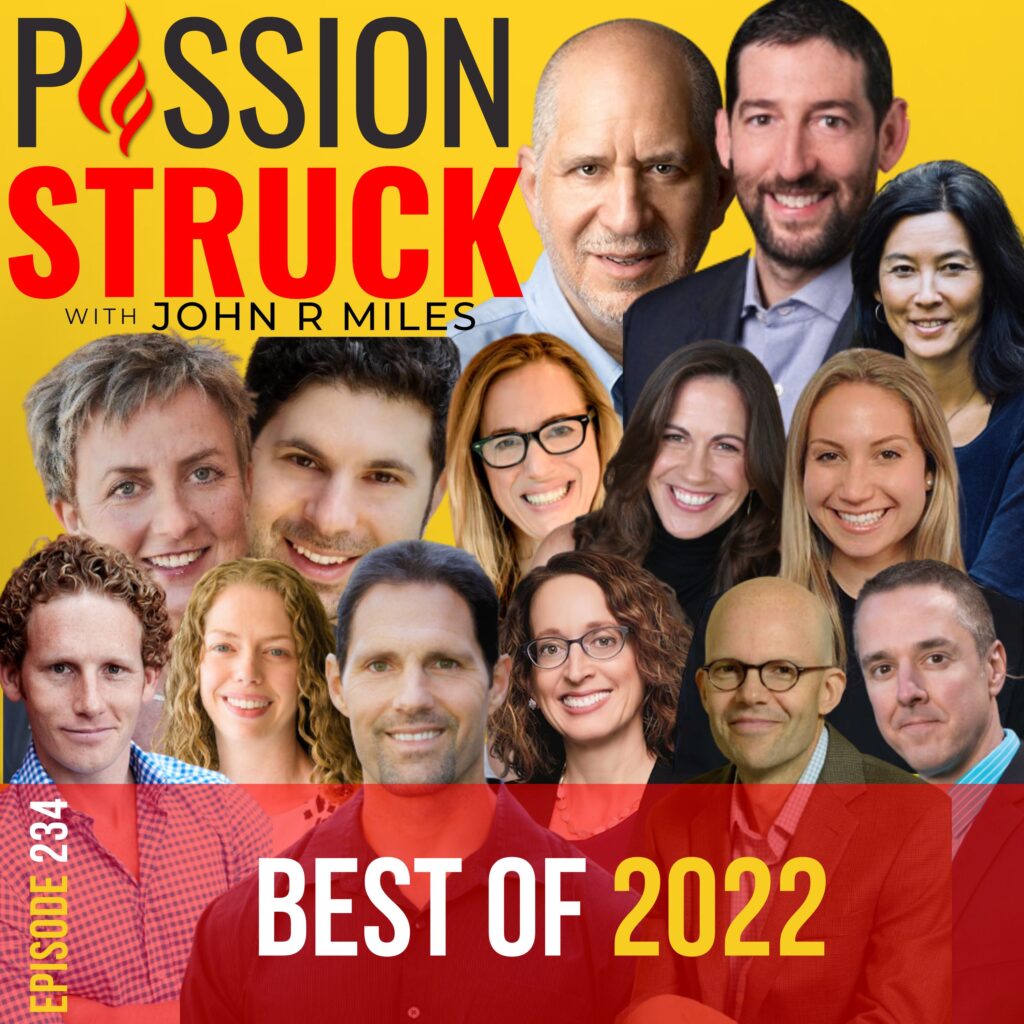Today’s special episode of the Passion Struck podcast highlights some of our best interviews from 2022, showcasing the power of intentional behavior change. You shouldn’t minimize the effort needed to transform your life. As you aspire higher, there are behaviors to change, perspectives to reevaluate, and skills to hone, which I discuss with our guests in today’s episode.
There is growing interest in the intersection of neuroscience, behavior science, and alternative health. By studying these fields together, we can better understand the various factors influencing our behavior and well-being and develop more effective approaches to promoting health and reducing suffering.
Today’s episode unites a world-class interdisciplinary team of academic and healthcare experts to advance the science, research, and practice of intentional behavior change, including Katy Milkman, Don Moore, Cassie Holmes, Max Bazerman, Ayelet Fishbach, Jonah Berger, Sara Mednick David Vago, Jordyn Feingold, Scott Barry Kaufman, Kara Fitzgerald, Dominic D’Agostino, Cynthia Li, and Chris Palmer.
By integrating their insights from these fields, we may be able to develop more comprehensive and effective strategies for improving health and quality of life.
What is Intentional Behavior Change?
Intentional behavior change refers to the process of intentionally altering or modifying a specific behavior in a conscious and deliberate way to achieve a specific goal or outcome. This can involve making small changes to existing habits or adopting entirely new behaviors. altering or modifying a specific behavior in a conscious and deliberate way. It involves setting a goal to change a particular behavior and taking steps to achieve that goal through a combination of motivation, planning, and self-regulation.
There are many different approaches to intentional behavior change, depending on the specific behavior being targeted and the individual’s needs and preferences. Some common approaches include:
- Self-monitoring: This involves paying close attention to the targeted behavior and keeping track of it through methods such as journaling or using a smartphone app.
- Setting specific, measurable, attainable, relevant, and time-bound (SMART) goals: This involves setting clear and achievable goals relevant to the targeted behavior and setting a timeline for achieving them.
- Using rewards and incentives: This involves providing positive reinforcement for engaging in the desired behavior, such as praising or rewarding the individual when they exhibit the desired behavior.
- Implementing habit-formation strategies: This involves creating a plan to establish a new habit by making the desired behavior a part of one’s daily routine.
- Seeking social support: This involves enlisting the help of friends, family, or a support group to help with the behavior change process.
Intentional behavior change can be challenging, as it requires a high level of motivation, self-regulation, and self-awareness. However, with the right approach and support, it can be an effective way to modify behaviors that may be harmful or undesirable and to improve overall health and well-being.
When we pay attention to time as our critical resource, that leads us to be more thoughtful and deliberate in how we spend it, spending in ways closer and more aligned with our values. So we become more deliberate with how we spend our time.
Dr. Cassie Holmes
Listen to the episode on Apple Podcasts, Spotify, Podcast Addict, Pocket Casts, Stitcher, Castbox, Google Podcasts, Listen Notes, Amazon Music, or on your favorite podcast platform. You can watch the interview on YouTube below.
Enjoy!
What We Discuss About The Power Of Intentional Behavior Change
While neuroscience, behavior science, and alternative health are distinct fields, they all contribute to our understanding of the complex relationships between the brain, behavior, and health. By studying these fields together, we can better understand the various factors that influence our behavior and well-being, and develop more effective approaches to promoting health and reducing suffering. Today’s guests explore these complimentary fields to help the listener understand how to create intentional behavior change.

Dr. Katy Milkman, a behavioral economist, and professor at the University of Pennsylvania, brought a unique perspective to the podcast by sharing her scientific principles and research on the subject of how people change. During our interview, I pointed out to Katy that her research indicates that regardless of your age, we all can do behavioral change. But I asked her why it is that people get this mindset that they can’t change or someone else can’t change.
Neuroscientist and associate professor at the Vanderbilt University School of Medicine, Dr. David Vago’s research aims to comprehend the neurological processes that underlie mindfulness and its impacts on the brain and behavior. The potential advantages of mindfulness and meditation for several medical disorders, including addiction, chronic pain, and depression, have also been emphasized by his research. Overall, Dr. Vago’s research has added to the body of knowledge demonstrating the value of mindfulness and meditation for enhancing mental and physical health. During our interview, I questioned him about why His Holiness the Dalai Lama has shown such a special interest in his work.
The blockbuster book Happier Hour was written by Dr. Cassie Holmes, a professor of marketing and behavioral decision-making at UCLA Anderson School of Management. Dr. Holmes offers a helpful manual on how to think about and spend time to live a more happy and fulfilling life. In our conversation, we talked about how our deliberate thoughts and actions influence a significant portion of our happiness and our intentional behavior change. This means that the conscious thoughts and deeds we commit to both affect our enjoyment greatly. I questioned Cassie as to why people who intentionally prioritize their time rather than their money report feeling happier and more content with their lives.
A New York Times bestselling author, Dr. Jonah Berger teaches marketing at the Wharton School at the University of Pennsylvania. His studies on consumer behavior, word-of-mouth marketing, and the psychological forces behind social transmission are well recognized. Based on his studies on the science of persuasion and the variables that affect people’s willingness to alter their ideas or behaviors, Dr. Berger wrote: “The Catalyst: How to Change Anyone’s Mind.” The book examines how people are affected by their social networks and the messages they hear from others and provides helpful advice for convincing and communicating with others. During our conversation, I questioned Jonah about how he encourages people to overcome inertia to change their minds.

Professor of behavioral science and marketing at the University of Chicago Booth School of Business, Dr. Ayelet Fishbach, is renowned for her studies on decision-making, self-control, and motivation. Our understanding of motivation, intentional behavior change, self-regulation, and decision-making has benefited from Professor Fishbach’s study, which has received several citations. Her study has ramifications for numerous industries, including business, psychology, and marketing. During our conversation, we talked about her book Get it Done, and I questioned her on why it might be so difficult to decide on a goal. And what distinguishes do goals from do not goals?
Don A. Moore and Max H. Bazerman have contributed significantly to the study of decision-making, behavioral economics, and behavioral ethics. Don Moore, a professor at Berkeley Haas, holds the Lorraine Tyson Mitchell Chair in Leadership and Communication and is the Associate Dean for Academic Affairs. Professor Max H. Bazerman is the Jesse Isidor Straus Professor of Business Administration at the Harvard Business School. During our conversation, we talked about their new book, Decision Leadership. I questioned them about why they believed that, as our workplaces change dramatically, our ability to make decisions and the function of companies as decision factories will also change significantly.
Dr. Scott Barry Kaufman is in charge of the Center for Human Potential at Columbia University. He is interested in applying his study to support the creative, content, and self-actualization of all types of minds. Dr. Jordyn Feingold is a doctor, researcher, author, teacher, and well-being specialist. She combined clinical research with positive psychology to provide a novel perspective on using the empirical science of well-being. The book Choose Growth: A Workbook for Overcoming Trauma, Fear, and Self-doubt was co-written by Jordyn and Scott. I questioned them as to why we should always choose growth rather than leading our lives on autopilot.
Cognitive neuroscientist Dr. Sara Mednick works at the University of California, Irvine. She is renowned for her brain, sleep, and memory studies. Dr. Mednick is the author of the book “Take a Nap! Change Your Life,” which examines the science of napping and its potential advantages for cognitive performance and general well-being, as well as the newly released book “The Power of the Downstate.” Our knowledge of the connection between sleep and brain function has improved because of Dr. Mednick’s study, which has received several citations. I questioned Dr. Medick on the importance of the downstate and its power for our well-being and intentional behavior change.
Dr. Dominic D’Agostino is a scientist and researcher at the University of South Florida who has significantly impacted the fields of nutrition and health. His research has mostly focused on the ketogenic diet and how it affects different biomarkers or quantifiable health measures. He has examined how the ketogenic diet affects blood pressure, cholesterol, and blood sugar levels, for instance, and discovered that it could result in changes in these biomarkers in persons with certain medical disorders, such as type 2 diabetes and metabolic syndrome. I questioned him about how to use these biomarkers as a therapeutic tool for a variety of medical issues during our conversation.
Dr. Kara Fitzgerald is a naturopathic physician, author, and expert in functional medicine and the author of the groundbreaking book Younger You. We discussed her ideas and suggestions for reversing biological aging and attaining optimum health and vigor. The significance of addressing the underlying causes of aging, such as inflammation, hormone imbalances, and stress, is one of Dr. Fitzgerald’s major areas of expertise. During our interview, I questioned her on the significance of adding lifestyle practices into one’s daily routine to promote reverse aging, implement intentional behavior change, and counteract the effects of aging on the body. These activities include regular exercise, stress management, and a balanced diet.
The book Brain Energy by Dr. Chris Palmer, a psychiatrist, and professor of psychiatry at Harvard Medical School, offers the first thorough hypothesis of what causes mental illness by combining years of clinical, neurological, and metabolic research into a single, overarching theory. Brain metabolic abnormalities are mental disorders of the brain. This theory ties together biological, psychological, and social elements to explain how physical and mental health are related. During our interview, I questioned Dr. Palmer on why many psychiatric medications do more damage than good.
Dr. Cynthia Li is a medical doctor and researcher who is known for her work in the field of autoimmune diseases. She is an advocate for integrative and functional medicine approaches to treatment. The role of environmental and lifestyle factors in the development and management of autoimmune conditions The use of functional medicine approaches, including nutrition and lifestyle interventions, to support immune health and manage autoimmune conditions and how the practice of Qigong can promote physical and emotional well-being. I asked Dr. Li about how Qigong has helped her improve her health and why she advocates for its use.
Please Scroll Down For Featured Resources
Thank You To Our Sponsors: More Info At PassionStruck.Com/Deals.
Our Patreon Page: https://www.patreon.com/passionstruck
Thank You, American Giant, For Sponsoring

Discover American-made essentials, activewear, and accessories for men and women. Shop durable hoodies, tees, pants, leggings & more from American Giant.
Get 20% off your order using code PassionStruck at https://www.american-giant.com/.
*Our Patreon Page: https://www.patreon.com/passionstruck.
Starter Packs
New to the show? These Starter Packs are collections of our most popular episodes grouped by topic, and we now have them also on Spotify. To find your old favorites, you can also browse starter packs for existing listeners. Every week, John interviews everyday heroes from all walks of life. Learn how to subscribe to the show and never miss a new episode and topic.
Like this? Please subscribe, and join me on my new YouTube platform for peak performance, life coaching, and personal growth: https://www.youtube.com/c/JohnRMiles/.
Resources From The Show On The Power Of Intentional Behavior Change
Please note that some of the links on this page (books, movies, music, etc.) lead to affiliate programs for which The Passion Struck podcast receives compensation. It’s just one of the ways we keep the lights on around here. Thank you so much for being so supportive!
Episode 155 with Dr. Katy Milkman: https://passionstruck.com/katy-milkman-behavior-change-for-good/
Episode 123 with Dr. David Vago: https://passionstruck.com/dr-david-vago-on-self-transcendence/
Episode 185 with Dr. Cassie Holmes: https://passionstruck.com/cassie-holmes-happier-hour-time-management/
Episode 227 with Dr. Jonah Berger: https://passionstruck.com/jonah-berger-the-catalyst-remove-change-barriers/
Episode 176 with Dr. Ayelet Fishbach: https://passionstruck.com/ayelet-fishbach-get-it-done-find-the-fun-path/
Episode 194 with Dr. Max Bazerman and Dr. Don Moore: https://passionstruck.com/max-bazerman-don-moore-better-choices/
Episode 188 with Dr. Scott Barry Kaufman and Dr. Jordyn Feinbold: https://passionstruck.com/jordyn-feingold-scott-barry-kaufman-chose-growth/
Episode 161 with Dr. Sara Mednick: https://passionstruck.com/sara-mednick-recharge-your-brain-body/
Episode 182 with Dr. Dominic D’Agostino: https://passionstruck.com/dr-dominic-dagostino-on-metabolic-health/
Episode 174 with Dr. Kara Fitzgerald: https://passionstruck.com/dr-kara-fitzgerald-become-younger-you/
Episode 216 with Dr. Chris Plamer: https://passionstruck.com/dr-chris-palmer-brain-energy-mental-health/
Episode 228 with Dr. Cynthia Li: https://passionstruck.com/dr-cynthia-li-on-intuitive-healing-using-qigong/
Follow John R. Miles On The Socials
* Twitter: https://twitter.com/Milesjohnr
* Facebook: https://www.facebook.com/johnrmiles.c0m
* Medium: https://medium.com/@JohnRMiles
* Instagram: https://www.instagram.com/john_r_miles
* LinkedIn: https://www.linkedin.com/in/milesjohn/
* Blog: https://johnrmiles.com/blog/
* Instagram: https://www.instagram.com/passion_struck_podcast/
* Gear: https://www.zazzle.com/store/passion_struck/
About John R. Miles
John R. Miles is a serial entrepreneur and the CEO and founder of Passion Struck. This full-service media company helps people live intentionally by creating best-in-class educational and entertainment content. John is also a prolific public speaker, venture capitalist, and author named to the ComputerWorld Top 100 IT Leaders.
John is the host of the PassionStruckPodcast. The show focused on exploring the mindset and philosophy of the world’s most inspiring people to learn their lessons to living intentionally. Passion Struck aspires to speak to the humanity of people in a way that makes them want to live better, be better and impact.
Stay tuned for John’slatest project, his upcoming book, which will be published in 2023.
Learn more about me: https://johnrmiles.com



